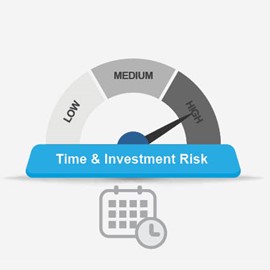
Investments that give you exposure to financial markets, can make or lose money as those markets go up or down.
![]() The risks depend on the underlying markets – investments in money markets, for example, have some limited risks while those in share or equity markets, especially in a single share or limited to certain sectors of the market, such as resources, are much more risky.
The risks depend on the underlying markets – investments in money markets, for example, have some limited risks while those in share or equity markets, especially in a single share or limited to certain sectors of the market, such as resources, are much more risky.
The two ways in which you can reduce your risk are to diversify and to stay invested for longer periods – in the investment world this is referred to as time in the market. If you can stay invested for a longer period, you reduce your risk of losing money because the high and low returns average out over the period.
Research by Old Mutual for its Long Term Perspectives 2024 publication shows that an investment in all the shares on the JSE – represented by the All Share index – had a 20% chance of delivering a negative return – or making a loss - over any one-year period in the past 64 years. That is a one in five chance.
![]() This means if you invested for a five-year period at any stage within the past 64 years, you may well have earned a negative return in at least one of those five years.
This means if you invested for a five-year period at any stage within the past 64 years, you may well have earned a negative return in at least one of those five years.
However, years of good returns outweigh the years of poor returns and the longer you stay invested, the more likely it is you will benefit from being exposed to years in which returns are good.
The graph below shows how after-inflation or real returns from equities have been distributed over the past 95 years, and how there are more years in which you earn an above-inflation return than a below-inflation return.

This graph also shows how difficult it is to time the market – choosing the right periods in which to enter or exit the market in order to earn only good returns and not the bad ones. Even professional, experienced fund managers admit that it is impossible to time the market with accuracy.
This is why it is often said that the key to investing is time in the market rather than timing the market.
The Long Term Perspectives research also shows that after-inflation, your average annual returns from South African equities over any five-year period in the past 64 years could have been anything from minus 14% to plus 31%.
![]() These highest and lowest returns are, however, outliers. When the annual returns earned over every five-year period (rolling on each year) over the past 60 years are averaged, the after-inflation return is 8%. In most five-year periods, your returns would be closer to this number rather than the best or worst returns for the period.
These highest and lowest returns are, however, outliers. When the annual returns earned over every five-year period (rolling on each year) over the past 60 years are averaged, the after-inflation return is 8%. In most five-year periods, your returns would be closer to this number rather than the best or worst returns for the period.
This means if you stay invested in equities, or an investment with a high exposure to equities, for five years, you can drastically reduce your chances of losing money, even though you may earn paper losses at certain periods during those five years.
The study of the average real returns recorded over various rolling periods - ranging from five years to 40 years – over the past 60 years also shows that the range between highest and lowest reduces the longer you stay invested - time mitigates the risk.
|
INVESTMENT TIP You need to stay committed to an investment long enough for the ups and downs in performance to smooth out into good average returns, to let the power of compounding increase the value of your capital and to compensate you for any costs.
|
Potential losses you may incur in equity markets over one year are vastly reduced when you invest for five years, and reduced further if your investment term is longer.
The Long Term Perspectives shows similar data for investments in global equity markets.
While time mitigates the risks you face, if you need to withdraw your investment before the recommended term, you risk realising less than you invested or your returns not being higher than inflation.
If your time horizon is short, your best bet is to invest in safer asset classes, such as bonds and cash, with a lower expected return.
If you can stay invested for the term, you can further reduce the likelihood of losing money through diversification. In a diversified investment, some bad calls are likely to be offset by other good calls. Read more: Why should I diversify my investments?
